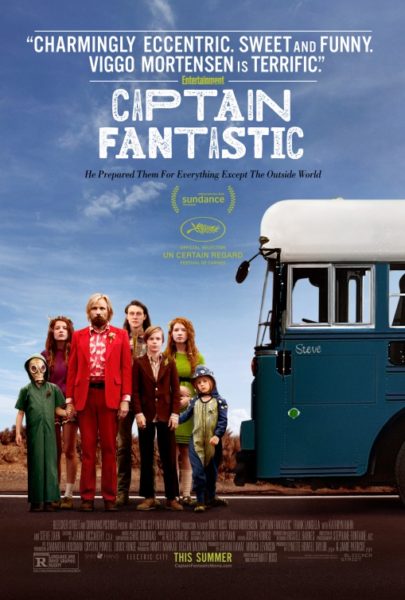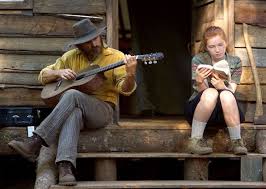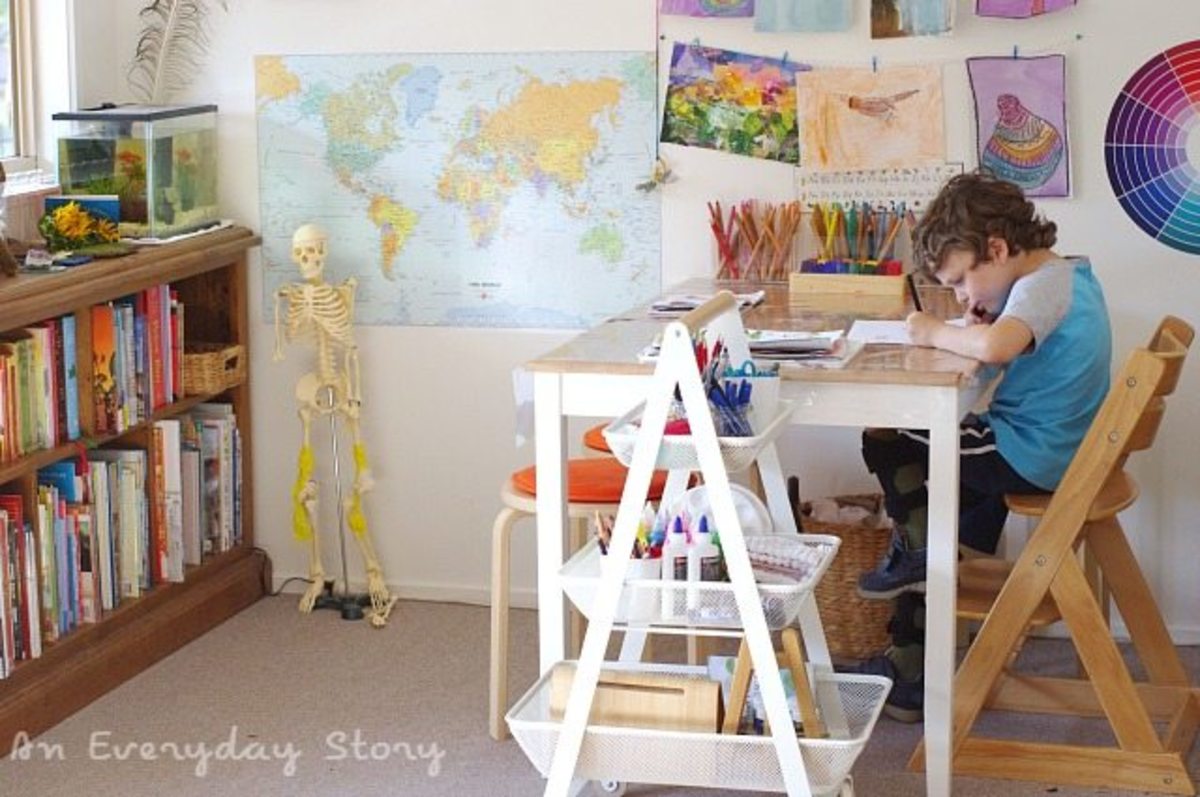How Accurately Does the Movie Captain Fantastic Portray Homeschooling?

The recent indie movie Captain Fantastic tells the story of a husband and wife with six children who move to the wilderness of the Pacific Northwest to escape corrupt society. The film begins when the oldest child is 18. The mother has just died, leaving the father to carry on their vision. The film will focus mostly on the father, Ben, his parenting, and how his choices have affected the lives of his children. In this review I will focus on how well the film portrays homeschooling families, drawing on my own experience homeschooling, and the knowledge of the homeschooling community I’ve gained over the past five years as a professional homeschool teacher.
Captain Fantastic is beautifully done as a film: the acting is stellar from the leads to the supporting cast, the filming is visually stunning, and the action keeps viewers interested. On to other issues.
Academic Homeschooling: Terrible Job
The weakest aspect of this film is the portrayal of academic homeschooling. The kids’ accomplishments are simply not reasonable, especially given the examples we see of Ben’s teaching skills. For instance, when we see the family doing school, everyone sits in a circle reading, and Ben is also focused on his own book. One of the teenagers is reading a physics or math textbook, and Ben asks, “Do you understand everything?” The kid says yes, and Ben leaves it at that. This is a rookie teaching mistake. An experienced teacher – which Ben ought to be at this point - asks a basic question about the material to access understanding, and moves on from there. Ben says he is going to give the kid a test tomorrow, without the audience seeing any engagement on his part in actual instruction. I have never heard of a homeschooler who learned advanced math concepts from a book, with no help.
When I was homeschooling my son, we did Algebra 1 and Geometry. I don’t have the math skills to teach that level, so I got a CD-ROM which taught each lesson, had practice problems for each concept, and supplied a step by step explanation of how to do every single problem in the book. My son and I watched the lessons together, he did the assignment, and I reviewed his work. We went back and watched the explanations of each problem he got wrong. As time went on, without me even asking, my son took on more responsibility, going back himself and figuring out all his wrong answers. Still, he was not teaching himself Algebra, and certainly not by just reading a textbook without any pencil and paper. Also, my son is a math whiz. He understood the CD-Rom lessons more quickly than I did. He finished all the math courses available at his high school a year early, won the school math award, and was awarded a full merit scholarship to the honors program at his engineering school. Even smart, talented kids need instruction, and we don’t see the dad in Captain Fantastic providing much.
I don’t think the problem is lack of screen time - I think the filmmakers don’t understand how kids learn academic skills. They seem to think it happens magically if you sit everyone down with books, and they spend a long time panning around all the kids quietly reading. Apparently they don’t know that kids have different learning styles, and silent reading only works well for some. Quick shots of Ben with a younger child on his lap teaching multiplication, then another quick shot of him pointing to a diagram in a math book, then building something with a teen using that geometry or physics concept would demonstrate that he is actually engaged in teaching them.
Somehow, despite Ben’s hands off approach, the oldest son speaks six languages. I wish the filmmaker thought that through, because I could accept two or even three languages, but claiming six just annoys me. Learning languages is complex for goodness sake.

Physical Skills Homeschooling: Awesome job
Here is where Captain Fantastic is completely convincing. Ben is shown teaching his kids self-defense by getting in there and grappling with them, breaking them up into groups to practice skills, taking feedback from the kids and adjusting objectives accordingly. When he takes them rock climbing, the older kids are above him on the rock face, and the younger are below and beside him where he can see them and coach them. He is believable as a homeschooling parent who teaches his kids a wide variety of physical skills. My guess is the filmmakers understand how physical skills are taught, but they don’t know enough to transfer those principles to teaching intellectual skills. What they needed for this movie is an academic homeschooling consultant. Maybe that is a new gig for me. If you are reading this, Movie People, message me. I’m available.
Literary References: Very Interesting. Bravo from the English teacher.
There were three references to classic literature, two that the filmmakers clearly intended, and one that I think they didn’t fully think through.
Middlemarch by George Elliot
Middlemarch is a 19th century British novel set in an English town, and one of the kids is reading it during an early schooling scene. The novel’s cover is shown to us several times. Here’s the take away: Middlemarch is about failed utopian dreams. The main character, Dorthea Brooke, wants to start a utopian commune, and is full of plans, but the obstacles are just too great. Dorthea’s utopia never happens, although she does eventually achieve peace and a measure of happiness. Early in the movie, we are given a subtle signal that this wilderness homeschooling utopia is not going to work out.
Lolita by Vladimir Nabokov
This one’s painful. Lolita is a novel about a middle aged man who molests his 12 year old step daughter. The novel is told from the point of view of the man, Humbert Humbert, who believes that he loves Lolita. The novel’s language is so beautiful that the reader can be drawn into the poetry, only to realize with a jolt that the lovely words are describing the sexual violation of a child. The filmmakers are clearly drawing a parallel here – the family idyll Ben has created may be charming viewers, but the kids are at risk.
The Republic, Plato
This is the one I’m not sure the filmmakers thought through completely. The Republic is an ancient Greek text describing an ideal society. Again, this ideal society never happened. We see a flashback with Ben and his wife talking about how they are going to raise their kids to be philosopher kings, which are the rulers in the ideal city of The Republic, which we know never happened. Does this scene tell us that these parents are wonderfully idealistic but also disconnected from reality? So full of themselves they think just the two of them can pull off a feat never managed anywhere anytime in Western society? I think the film is hinting these things.
Here’s what I think the film is missing. Ancient Greek philosophers including Plato assumed that slavery was necessary for civilization, because the work of providing basic necessities for a group of people takes so much time that in order to have individuals who can devote the necessary time to education and thought to qualify as philosophers, other individuals must be forced to take up the slack. Only slaves, people forced to work harder for less reward than any person normally would, can support the leisure time necessary for philosophers, argued the Greeks.
The Choices in a Homeschooling Lifestyle
Captain Fantastic does a good job pointing out the absurdity that while Ben is bragging that his kids are independent thinkers, the kids are behind him chanting in unison yes-we-are-all-independent-thinkers, and then they all parrot their father’s political ideas. But the movie misses the fact that no society has ever found a way to allow a nuclear family to provide all their own basic needs (gardening, hunting, clothing production and shelter), while educating the next generation in academic, physical and artistic skills, without any outside help. While the film points out that Ben is flawed in being so stuck on his opinions that he isolates himself from the rest of the world, it misses the fact that Ben is too competent to be remotely realistic. If people could manage this much on their own, half of us would be off living in woodsy paradises instead of doing the hard work of getting along with each other.
Homeschooling families need help and support; they need a community to do a good job. They don’t just need community for socialization (as Captain Fantastic argues), they need community for educational competence. If homeschool kids are going to speak multiple languages, play musical instruments, and also be martial arts experts, parents have to either hire a teacher for one or more of those skills, or trade with another homeschooling parent who has those skills, or maybe be realistic about expecting the kids to do so much. Also, homeschooling families cannot expect to pull all this off while mom makes the family’s clothes with an old fashioned sewing machine, and dad hunts down, skins and cooks dinner, while also assembling wooden bird feeders to earn cash. Homeschooling requires families to make choices about their time. From what I have seen, homeschoolers choose things to specialize in: drama productions, lots of cooking from scratch, homemade clothes, lots of outdoor activites, social justice work, political involvement. But no one does all of it.
Is the Movie Realistic About Mental Illness?
Most importantly, carrying on a serious homeschooling schedule while one of the parents goes through several years of a major psychiatric illness never brought under under medical control is impossible.
This one hit home for me. I was raised by a mother with a major psychiatric illness, and without medical management, it sucks the life out of the family, especially kids, who are still forming their identities. Don’t tell me six kids are getting educated to the point of sounding like little professors while mom swings through the cycles of elation and depression the kids describe. The movie shows the grief the children feel at their mother's death, but not the brutal toll witnessing her mental suffering would take. I was in my early teens when I went through this, and I had trouble thinking coherently, making plans for the future, and interacting socially as a result of the emotional stress of the things I witnessed. Enough people commented that I "just didn't look OK" that I know I showed the strain.
Maybe this movie just took on too much, but the children of a mother who suffers this severity of mental illness would be in more pain and turmoil than we see here. Having the mother die of cancer would have eliminated the problems I'm talking about.

Conclusion
This movie made me reflect on education, homeschooling and families. I know the film wanted to be about modern overuse of technology and especially social media, but that aspect was kind of meh for me. I’ve heard it too many times before.
I’ve written more than I expected already – perhaps I will write another post about Captain Fantastic’s portrayal of family dynamics, and how the film deals with gender. I recommend this movie for homeschooling parents. It would also be interesting for homeschooling kids, who would enjoy talking about what worked in the family's approach and what didn't. Do be aware there is one shot of full frontal nudity (Viggo Mortensen as Ben).








